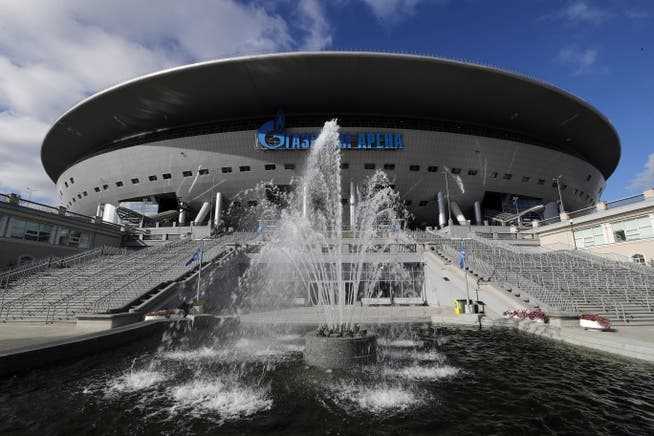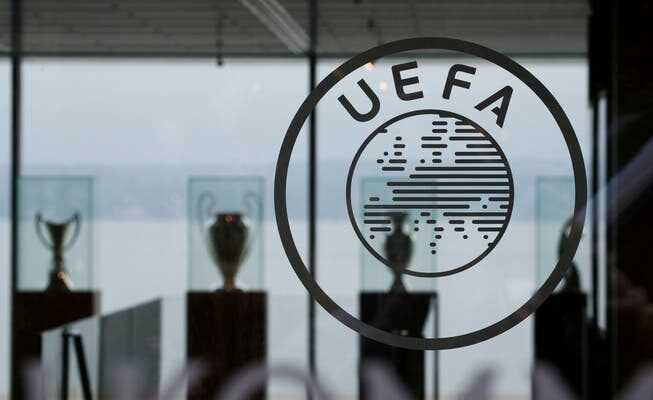The fact that the European football association Uefa is moving the final of the Champions League from St. Petersburg to Paris is a gentle measure against Russia. There is no more hardness, not yet.
Uefa takes mild action against Russia’s invasion of Ukraine and moves the Champions League final from St. Petersburg to Paris.
The expectation that sports associations will lead the way with sanctions and set an example has not increased over the years – be it on doping issues or in armed conflicts. So what the European football association Uefa announced in a communiqué on Friday in the wake of the worsening Ukraine crisis is rather tame. He does the minimum and transfers the Champions League final from St. Petersburg to the Stade de France in Paris at the end of May.
This is by no means a serious sanction, especially since Uefa has gotten used to organizing finals in other cities quickly during the pandemic. The fact that she expresses “thanks and appreciation” to France and its President Emmanuel Macron in this context is almost cynical against the warlike background in Eastern Europe. As if hosting a final three months from now would be an extraordinary achievement. From a purely sporting point of view, the problem disappears because the Russian and Ukrainian clubs in the European Cup are doing moderately to poorly again this season. Spartak Moscow will have to play the round of 16 in the Europa League on neutral ground.
The #UCLfinal In 2021/22, St. Petersburg will be relocated to the Stade de France in Saint-Denis.
The game will kick off at 21:00 CET on Saturday 28 May as originally planned.
The whole statement ⬇️ https://t.co/IuQAqeW6ZV
— UEFA.com DE (@UEFAcom_de) February 25, 2022
Gazprom in the Uefa Executive
Far more spicy is the constellation in qualifying for the World Cup in Qatar at the end of the year. The play-off phase is on March 24th. Russia will play Poland in the first round and then, if they win, Sweden or the Czech Republic, with home advantage in both games. Ukraine will meet Scotland away, and if successful, they will also meet Austria or Wales away afterwards. According to the joint communiqué, the three (potential) opponents of Russia will refrain from traveling to Russia. The World Cup is not under the care of Uefa, but of the world association Fifa. The latter has not yet been heard on this matter.
The name of a member of the executive committee and his connection to the Russian energy company Gazprom show how directly Uefa is affected by the Russian aggression. Alexander Dyukov was not only president of Zenit St. Petersburg between 2008 and 2017, he has also been president of the Russian Football Union since 2019. According to the Uefa website, Dyukov has “held various management positions in the largest Russian oil and petrochemical companies” since 2003. He is the CEO of Gazprom subsidiary Gazprom Net.

The Gazprom Arena in St. Petersburg: The Russian energy company Gazprom is the main sponsor of Zenit St. Petersburg and the Uefa Champions League.
Gazprom has been a main pillar of Uefa sponsorship since 2012, every Champions League game in every stadium and on every (pay) TV channel is advertised with Gazprom in the most prominent place. Every year, a double-digit amount from the Russian company, which is under state control, flows into Uefa’s coffers and from there back to the clubs. If YB collects Uefa premiums, part of it comes from Russia. Uefa circles say that Dyukov took part in the virtual executive meeting on Friday morning, but walked out. One wonders why he got involved, especially since all the agenda items concerned Russia.
Direct links from high-level sports and football bodies to Russian politics are nothing new. This is what the 2014 Winter Olympics in Sochi and the 2018 World Cup in Russia stand for, and the red carpet was rolled out for Vladimir Putin. And Vitaly Mutko, the notorious, long-standing Fifa top official, got stuck in the swamp of state-organized doping as his country’s sports minister and had to resign before the 2018 World Cup. Mutko also headed Zenit St. Petersburg and tied the club to Gazprom.
The sponsor of EV Zug
At the moment, despite all the dependencies, it is difficult to imagine on what basis the marriage between Uefa and Gazprom should continue. In 2021, the sponsorship contract was extended and even expanded. The same applies to the major German club Schalke 04, the former Bundesliga club, which also receives tens of millions from Gazprom. In contrast to Uefa, he at least followed up empty phrases with action and removed the Gazprom logo from the club jersey. It’s hard to imagine that things won’t stay that way.
In Swiss team sports, Russia is not present with Gazprom, but indirectly with Nord Stream AG as the main sponsor of EV Zug. The merger was extended last year to 2024. On Friday, the club announced that the sponsorship commitment would be suspended “until further notice” – “EVZ will remove the various Nord Stream AG logos.” Due to the delivery times, this cannot be implemented immediately in some cases.
The sponsorship commitment between Nord Stream AG and EVZ will be suspended. pic.twitter.com/Q2DTGNkBiH
— EVZ (@official_EVZ) February 25, 2022
While other decision-makers hesitate or initially switch to neutral terrain, the Finnish ice hockey club Jokerit Helsinki, which is under strong Russian influence, has a point. He was due to play against Spartak Moscow in the East European Continental Hockey League play-off on March 1, but is now ending the season.
